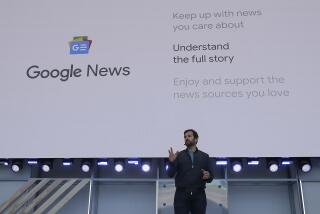Federal Judge Blocks Sale of S.F. Chronicle
- Share via
A federal judge Thursday blocked the $660-million sale of the San Francisco Chronicle to Hearst Corp. for at least two weeks after foes argued the deal was a sham that would create a newspaper monopoly in the city.
The ruling came just hours after the U.S. Justice Department approved the sale to Hearst, which has operated the rival Examiner for the past century.
U.S. District Judge Vaughn Walker’s decision also halts Hearst’s plan to sell the Examiner to the Fang family, owners of AsianWeek and a string of free newspapers in the Bay Area.
Walker said sufficiently serious questions had been raised about whether the Fangs could afford to keep the second newspaper alive to warrant further scrutiny of the Chronicle sale, which had been set to close last night..
The judge issued a temporary restraining order and set an April 13 hearing to determine if the legal battle launched by political consultant Clint Reilly should go to trial. Reilly, who made an unsuccessful attempt to buy the Examiner, has sued to block the Chronicle sale.
“We think we have a very strong case,” said Joseph Alioto, Reilly’s attorney. “We feel strong on the law and the fact.”
The Chronicle is the largest newspaper in Northern California with a circulation of 465,000; the afternoon Examiner sells 105,000 copies each day.
Hearst announced two weeks ago that it was transferring ownership of the Examiner, its 120-year-old flagship, to the Fangs. Although the media giant said it would put up $66 million to help the new owners during the first three years of operation, Reilly contended that the subsidy wasn’t nearly enough to keep the Examiner afloat.
Reilly hired experts in newspaper operations and finance, who concluded that a subsidy of at least $250 million would be needed to make the Examiner a viable competitor.
Walker agreed that serious questions had been raised about “the continuing viability of the Examiner as an independent newspaper” under the Fangs. He also said the deal might run afoul of the federal Newspaper Preservation Act, which allows newspapers to operate jointly when one is in financial trouble.
If the Examiner cannot survive under the terms of Hearst’s agreement with the Fangs, Walker said, “it is doubtful that the intent and purposes of the Newspaper Preservation Act are likely to be adhered to.”
The Chronicle and Examiner have a profit-sharing joint operating agreement that has kept both newspapers in business for more than 30 years. The deal would end that arrangement.
Ted Fang, who would be publisher of the new Examiner, could not be reached for comment Thursday. Hearst officials did not return calls.
But one legal expert said he won’t be surprised if Hearst appeals the ruling in the next few days.
“Unless the judge thinks there’s evidence the deal between Hearst and the Fangs is a sham, I don’t see what basis he has for this ruling,” said Stephen Barnett, a media law professor at UC Berkeley’s Boalt Hall law school. “It’s a surprising decision. I don’t know what better alternative the law can compel.”
Alioto said he would like to see the Chronicle put up for sale to another suitor and Hearst use its money to beef up the Examiner.
“We’ll do whatever it takes to have two competing newspapers in this town,” Alioto said. “There’s got to be two viable competing newspapers. We’re talking about the real thing.”
Fang has announced plans to switch the Examiner from afternoon to morning publication in August and compete with the Hearst-owned Chronicle.
Earlier Thursday, Justice Department officials said their concerns about competition had been satisfied by Hearst’s agreement to transfer the Examiner to owners who would continue daily publication.
“For the first time in 35 years, San Francisco will have two independent daily newspapers,” said Antitrust Division head Joel Klein. “Consumers, such as advertisers and readers, will obtain the benefits of full competition between two daily morning papers.”
More to Read
Sign up for Essential California
The most important California stories and recommendations in your inbox every morning.
You may occasionally receive promotional content from the Los Angeles Times.










